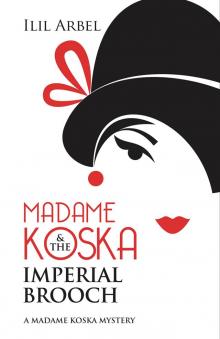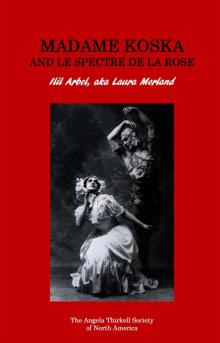- Home
- ILIL ARBEL
Miss Glamora Tudor!: The New Chronicles of Barset: Book One Page 6
Miss Glamora Tudor!: The New Chronicles of Barset: Book One Read online
Page 6
Unable to control her emotions, whatever they were meant to be, Lady Fitz-Gardner stepped from behind the palm and approached the young man. “What is the matter, sir?” she asked tenderly. “I heard you sigh. Are you in pain?”
Slowly, the young man raised his eyes from the red rose and looked at the shimmering white-clad vision. He was incredibly handsome in his impeccable evening clothes, his blue eyes blazing with untold passion, his square jaw held tight. “I have seen you inside,” he said in a low voice. “No, I am not ill; I am just unhappy at the moment. But it is of no consequence.”
“The pain of the heart and of the mind is worse than any physical pain,” whispered Lady Fitz-Gardner. The script writers unanimously agreed that this profound statement was masterfully crafted by Mrs. Rivers in her book, and were determined to use it verbatim in the film.
“Ah, to be understood is the best way to heal,” said the young man with a charming, tired smile. “Will you dance with me, Lady Fitz-Gardner? They are playing an enchanting waltz.”
“You know my name, sir? You have the advantage of me. I do not know yours.”
“For the moment, it is perhaps best if it remains so. But would you forgo conventions to the extent of a waltz with a stranger?” (And if the reader is curious why Mr. Chardonay should wish to conceal his name at the beginning of his intriguing acquaintance with Lady Fitz-Gardner, I am afraid neither Mrs. Rivers nor the script writers ever bothered to explain, most likely because they assumed the reader would Understand).
“I will, sir,” said the lovely creature and wafted into his waiting arms. The music soared and rolled and they started gliding on the smooth shining floor of the conservatory, and… “Ouch!” screamed Glamora as Edmond stepped right on her silver-clad toes. “Hank, how many times did I tell you to keep your feet just a bit further back?”
“So sorry, Miss Tudor,” murmured Edmond, wishing he were dead. “I am just clumsy…”
“My boy, we will have a few rehearsals and one way or another we must teach you how to dance,” said Mr. Goldwasser, who of course was there all along. “There are three dancing sequences in this film, all of them most important to the plot. You must get the hang of it.” Glamora was staring at her shoe, which the abuse committed by a large young man with big feet did not improve.
“I have never been a good dancer,” said Edmond. “I told you right away.”
“We’ll work on it, don’t worry,” said Mr. Goldwasser. “Miss Brinton! Would you kindly step over here for a minute?” A tall, angular, gray-haired woman in her early fifties came over. “Yes, Mr. Goldwasser?” she said in a pleasant, husky voice that added a touch of extravagance to her charming American accent.
“Keith, I imagine you do not know that our dear Miss Brinton, who is the best assistant I have ever had, possesses an interesting secret talent? She is an amazing dancer, as good as a professional. She will coach you, won’t you, Miss Brinton?”
“Wonderful,” Edmond said weakly, trying to emerge from his deep gloom.
“Gramophone,” said Miss Brinton without raising her voice. Immediately, a young man in overalls came, staggering under the weight of a gramophone. He put it on a little table, then hooked it up to the electrical outlet. Miss Brinton, used to her power over people, took off her shabby tweed jacket and her sensible flat shoes. “Shoes,” she said to no one in particular. A young woman came running with a pair of high-heeled, bright green shoes. Miss Brinton put them on, and with her brownish tweed skirt and cotton stockings, looked so odd that Edmond almost had the giggles, but he controlled himself.
“Come along, Mr. Keith,” Miss Brinton commanded. “We are going to practice the waltz. Now, one-two-three, one-two-three, one-two-three…” and she swirled him away to the sweet sound of “Roses from the South.” Edmond became so dizzy with the exercise that his head was swimming, but he shut his eyes and persevered doggedly. This went on reasonably well for a while, and then Edmond somehow got one of his feet tangled with the other, and fell down, dragging Miss Brinton with him.
“It’s quite all right, Mr. Keith,” she said, completely unruffled, and got up, straightening her skirt. “Now, back to work. One-two-three, one-two-three…”
“Yes,” said Mr. Goldwasser with approval. “If you fall off your horse when you are learning to ride, you must get back on it right away so as not to lose your nerve. Miss Brinton knows what she is doing.” Most of the people began to leave the hall, and Edmond went on dancing valiantly, though without any trace of grace or charm whatsoever.
Mr. Goldwasser turned and saw his secretary staring transfixed at the odd couple dancing away. “Not very good, ah, Alcott?”
“Dreadful,” said Mr. Alcott, his voice full of resentment. “To think that Miss Tudor, who is as light on her feet as a dandelion seed, should submit to the horrible style of this incompetent fool.”
“Now, Alcott, Keith is far from being a fool,” said Mr. Goldwasser tolerantly. “Of course he can’t dance, nor is he the perfect fit for the role of Nestor Chardonay in the first place. He is too big, too muscular, attractive but not graceful. He was perfect for the Simon Bolivar part in Fever in Peru, but a romantic high society film is not exactly his style. But what can I do? Glamora has a kind of fixation on him, though for the life of me I can’t imagine why. She has had many handsome boys as her co-stars, but I have never seen her so smitten with any of them. She nearly blackmailed me into allowing him to do the second film. I had someone else in mind altogether, you know. The usual, an unknown who had never worked with her, and just as good looking as Keith; I envisioned the part acted by someone more of the Cary Grant style of elegance.”
“Perhaps she is in love with Keith,” said Mr. Alcott, determined to make himself as miserable as possible.
“Nah,” said Mr. Goldwasser. “She is not in love with him. But she does find him attractive in some way, there is no doubt of that, and I like to give her what she wants. The important thing is that Glam is always the consummate professional and in the end she would do nothing to jeopardize the film, so we need not worry, Keith or no Keith.”
“I would like to break every bone in his body,” said Mr. Alcott. Mr. Goldwasser laughed.
“I wouldn’t bother,” he said. “No point in it. Glamora has vamped and conquered generations of fine-looking boys; it’s a hobby with her. And Keith is not encouraging her at all, it’s all Glam’s doing. I suspect he would love to be released from his contract. Also, I have a feeling he is much more interested in Mr. Clover’s pretty little cousin. Stop fretting, Alcott. All will be well. As we say in Hollywood, I always have a Plan B ready.”
“Well, well,” said Miss Merriman, looking extremely gratified. “I must say I had not expected that,” and she went on reading a letter. Lord and Lady Pomfret, also at the breakfast table, looked at her with anticipation.
“This letter is from Miss Tudor,” said Miss Merriman. “When she visited the Towers she promised to send for me to attend the premiere of the revival of one of her science fiction films in London. Apparently it is to take place two weeks from today, and she wants me to come, join her and Mr. Goldwasser for the premiere, and spend the night at their hotel. I would very much wish to go, if it is not inconvenient to you, Lady Pomfret. This is one of the films I particularly wanted to see, it is called Amazon Tiger Queen of Venus and it was extremely well-received when first introduced. I have read all about it.”
“It will not be inconvenient at all, Merry,” said Lady Pomfret very kindly. “By all means, go and have a wonderful time.”
Lord Pomfret laughed gently. “I cannot reconcile your love of thrilling science fiction and detective films with the rest of your personality and tastes, Merry,” he said affectionately.
“To tell the truth, I can’t quite explain it myself,” said Miss Merriman. “I can’t imagine how it started, but there you are.”
“Do you know what this film is about?” asked Lady Pomfret curiously.
“Oh, yes, of course,” said Miss Me
rriman. “It is about a descendant of the mythological Greek hero Theseus, and how he met his Amazon wife Hyppolita on another planet.”
“I don’t understand,’ said Lord Pomfret. “Theseus and Hyppolita are supposed to have lived thousands of years ago. What are they doing on another planet?”
“I admit, it is somewhat complicated,” said Miss Merriman. “Unless you are used to the way science fiction writers treat history or even current events. It’s all fodder for things that happen, in their stories, hundreds of years in the future. This story takes place during the twenty-fifth century, and the hero, Commander Theseus Athanasias, a Greek-American who is not the mythical Theseus but his direct descendant, takes his spaceship to another solar system. I believe it is Alpha-Centauri, since it’s used so often, but I am not certain of it; at any rate they also have a planet by the name of Venus, and it’s full of jungles. There he meets a beautiful Amazon Warrior Queen, Hyppolita, who is somehow associated with tigers, I am not sure how, and wears magnificent tiger-inspired dresses. She is not related to the old Hyppolita at all, I suspect, just a common coincidence; science fiction films are full of such serendipities. She and her tribe, consisting only of women with absolutely no males present, are threatened by a galactic war, and Theseus is stranded on this planet and has to devise a way to save everyone. He does that with the help of a very large and rather funny robot who can read the minds of the aliens who are behind the war, and eventually all the Amazons fall in love with Theseus’ men and the whole tribe goes back to earth to get married.”
“Are there enough men on the spaceship for all the Amazons?” asked Lady Pomfret, who was always interested in the practical side of things.
“Oh, yes. I imagine that the script writer would make sure that the number of the Amazons is exactly equal to that of the men on the ship. That is how it is always done in these films.”
“Well, I hope you have a good time in London,” said Lord Pomfret, resigned to never understanding the plot of the intriguing film and determined not to ask what a robot was, large or small, funny or not. “Is Miss Tudor sending the car to fetch you?”
“Yes,” said Miss Merriman. “I must write and let her know I am indeed coming.”
Miss Merriman had a wonderful time in London, but since we do not go there ourselves anymore, preferring to stay in Barsetshire, we will not describe it. We will only note that she made friends with Miss Brinton, as they had so much in common, and they both hoped to meet again.
A few weeks later, Lady Pomfret came into the library, where Lord Pomfret was writing letters, in a most excited mood.
“Gillie, Jessica just called. She wants us to join her party for dinner at the White Hart. She and Aubrey are entertaining Miss Tudor, Mr. Goldwasser, his assistant Miss Brinton, and his secretary Mr. Alcott. She wants to show them what she refers to as ‘local colour.’ This will be a nice opportunity for me to meet Glamora Tudor, which I am really looking forward to after all the things Merry told me.” She was flushed and excited, and Lord Pomfret thought that she looked just like Sally Wicklow, the Estate Manager’s young and enthusiastic sister, who had the best hands in the county. Lord Pomfret said to himself that to give Sally the pleasure of meeting Glamora Tudor he would cheerfully give up at least three committees and two agricultural fairs, or even an evening spent on filling out forms sent by Them to struggling land owners.
“And would you believe, Gillie, Mr. Goldwasser asked specifically that we bring Miss Merriman! He seems to have been greatly taken by our Merry, and bores everyone while he talks about her merits, class, refinement, etc. Good old Merry, I think she has made a conquest.”
Lord Pomfret laughed. “I hope so,” he said jokingly, “what an opportunity for our Merry! Can you imagine her as Mrs. Goldwasser, entertaining Hollywood royalties?”
“Yes,” said Lady Pomfret loyally. “Merry can do anything – and do it exceedingly well. If she would like Mr. Goldwasser enough to marry him, she would become the perfect Hollywood hostess.” Lord Pomfret laughed at the notion, but very kindly.
As Lord Pomfret, Lady Pomfret, and Miss Merriman entered the White Hart, Burden, the old headwaiter, was standing in the hall, which we still cannot bring ourselves to call a lounge, though we know that some day we must succumb to the inevitable and use this ghastly word.
“How are you, Burden?” asked Lady Pomfret, who knew everyone in the county.
“Thank you, very well, my lady, except for the leg. The doctors don’t understand my leg. Dr. Ford has been after me to do an X-ray of it. But that is photography, I said to him. I don’t hold with photography, no sir, not at my age.”
Lady Pomfret made the appropriate comments, and Burden continued. “Your party is waiting at the bar, and asked to be told as soon as you came. Allow me to escort you to your table.”
Soon the whole party was sitting at the most coveted of all the tables, a round one situated in a bow window at the far end of the room, where one could see the most beautiful spire in England soaring against the soft, dusty-rose sky.
“What a beautiful view,” said Mr. Goldwasser to Miss Merriman, who was sitting on his right. “I adore English architecture.”
“I am gratified to hear that,” said Miss Merriman, “particularly from an American, since you have such grand and modern architecture in your own country. It’s so nice that you also enjoy our old style.”
“Have you ever visited the United States, Miss Merriman?”
“Sadly, no, Mr. Goldwasser. I have had a very busy life, so any visual image I have of America comes from the films, for which I am grateful.”
“But some day you will, I hope,” said Mr. Goldwasser enthusiastically. “I would so much like to show it to you personally. With your taste and culture, I am sure you will be able to appreciate the valiant attempts of a young country.”
“I do not pretend to such high standards, though I am truly grateful for your good opinion, Mr. Goldwasser, but indeed, I am sure I will appreciate the grandeur, the freshness, and the well-known hospitality of your great country.”
“Have you ever read the very amusing book by Mrs. Frances Trollope, Domestic Manners of the Americans? She did not share your views…” said Mr. Goldwasser, smiling.
“I always thought her work was condescending, and her opinions bordering on the vulgar,” said Miss Merriman disdainfully. “They were tainted by her suffering and poverty, and she did not make the attempt to rise above them. No, I do not like her book.”
“I am happy if I can contribute, in a small way, to your visual image of America,” said Mr. Goldwasser.
“Indeed you have, Mr. Goldwasser. More than you think, since I am very fond of the cinema. I have seen many of the films made by GMG. and enjoyed them all. You bring much joy to our country.” Mr. Goldwasser seemed very pleased.
Dinners at the White Hart were celebrated and known to be as good as those offered by many fine London restaurants. The meals were not particularly imaginative, perhaps, since the cooks were not usually foreigners, but nevertheless beautifully cooked and well-served. For the present party, Burden suggested a good clear soup made from real stock, excellent fish fillets, since the fish was brought daily by an arrangement with a fishing village on the coast, served with butter sauce, and a perfect loin of mutton with potatoes and peas. Followed by an elegant pudding and coffee, this was a meal good enough even for visiting dignitaries, and the party was enjoying it, accompanied as it was by just the right wines, chosen personally by Burden.
As they were nine people at the round table, and two women were obliged to sit next to each other, Lady Pomfret was not sorry to find herself next to Miss Tudor.
“I am happy to have made your acquaintance at last, Lady Pomfret” said the actress. “I enjoyed staying at the Towers and I wanted to thank you in person for your hospitality.”
“Everyone enjoyed meeting you, Miss Tudor,” said Lady Pomfret. “And they told me so many interesting things about your visit. It is a great pleasure for me that t
he plans for your current film have been arranged under my roof.”
Miss Tudor laughed. “I am not so sure Mrs. Rivers liked me very much at first,” she said. “However, this was my fault, since I was not very gracious to her; I must admit she irritated me. But once I consented to do the film after her book, all was well. I am not much of a reader, Lady Pomfret, nor am I, to tell the truth, very highly educated in matters of literature, but I can tell that even though this book is not very good, it would nevertheless make a perfect base for a successful film. Miss Merriman, whose judgement could not be doubted, said the same thing to Mr. Goldwasser when they first met.”
“I never read Mrs. Rivers’ books these days, Miss Tudor. I read one, years ago, and found it so silly that I simply could not finish it. But since I am not a great reader either, of course I believe you and Mr. Goldwasser and I plan to see the film when it is released. Incidentally, it seems to me that Miss Merriman and Mr. Goldwasser have become quite good friends.” Lady Pomfret looked at them as they were engaged in an animated conversation that seemed to absorb them in each other.
“Yes, indeed, I have made the same observation,” said Miss Tudor, smiling. “Who would have thought? But I do like her immensely myself. She is one in a million; she seems to understand one deeply and yet maintain her distance.” Which was a surprising insight, coming from the very literal Miss Tudor.
In the meantime, Aubrey was talking to Miss Brinton. Jessica could tell that he was studying her voice, her speech, her clothes – absorbing everything about her that could some day be used in a play containing a successful, middle-aged American business woman.

 ANCIENT ALIENS: MARRADIANS AND ANUNNAKI: VOLUME ONE: EXTRATERRESTRIAL HOLIDAYS
ANCIENT ALIENS: MARRADIANS AND ANUNNAKI: VOLUME ONE: EXTRATERRESTRIAL HOLIDAYS Ancient Aliens_Marradians and Anunnaki_Volume Two_Extraterrestrial Gods, Religions, and Mystical Practices
Ancient Aliens_Marradians and Anunnaki_Volume Two_Extraterrestrial Gods, Religions, and Mystical Practices Madame Koska & the Imperial Brooch
Madame Koska & the Imperial Brooch Ancient Aliens: Marradians and Anunnaki: Volume Two: Extraterrestrial Gods, Religions, and Mystical Practices
Ancient Aliens: Marradians and Anunnaki: Volume Two: Extraterrestrial Gods, Religions, and Mystical Practices Miss Glamora Tudor!: The New Chronicles of Barset: Book One
Miss Glamora Tudor!: The New Chronicles of Barset: Book One The Cinnabar Box (Guardians of the Earth)
The Cinnabar Box (Guardians of the Earth) Madame Koska and Le Spectre de la Rose
Madame Koska and Le Spectre de la Rose The Lemon Tree
The Lemon Tree Their Exits and their Entrances: The New Chronicles of Barset: Book Two
Their Exits and their Entrances: The New Chronicles of Barset: Book Two